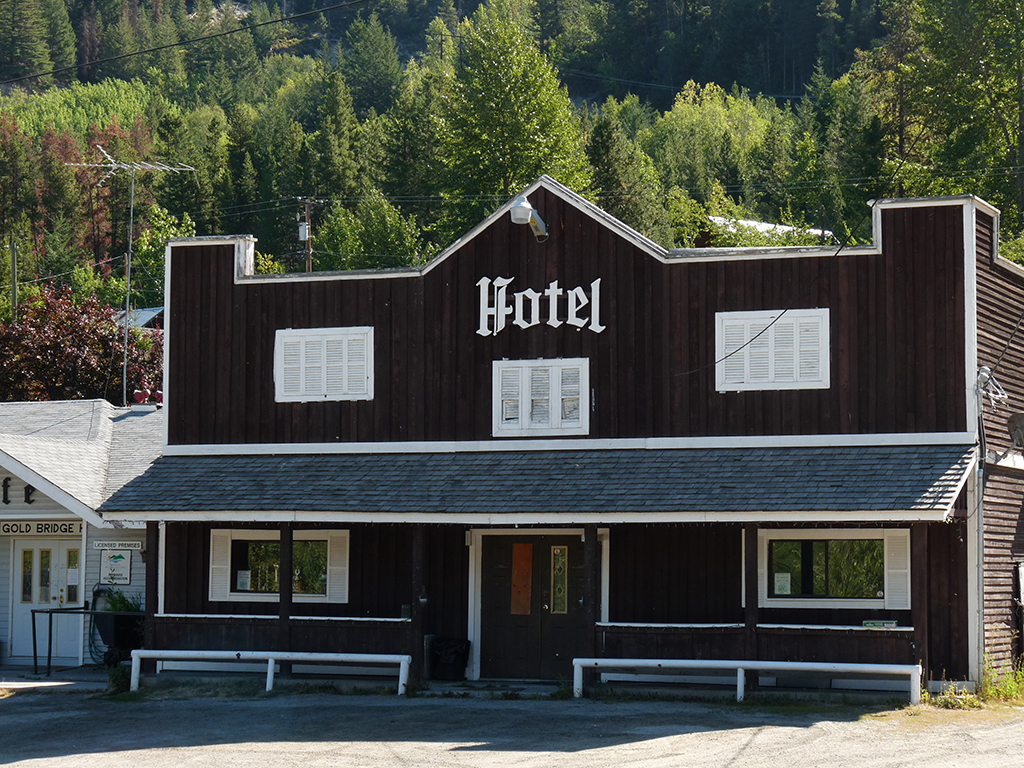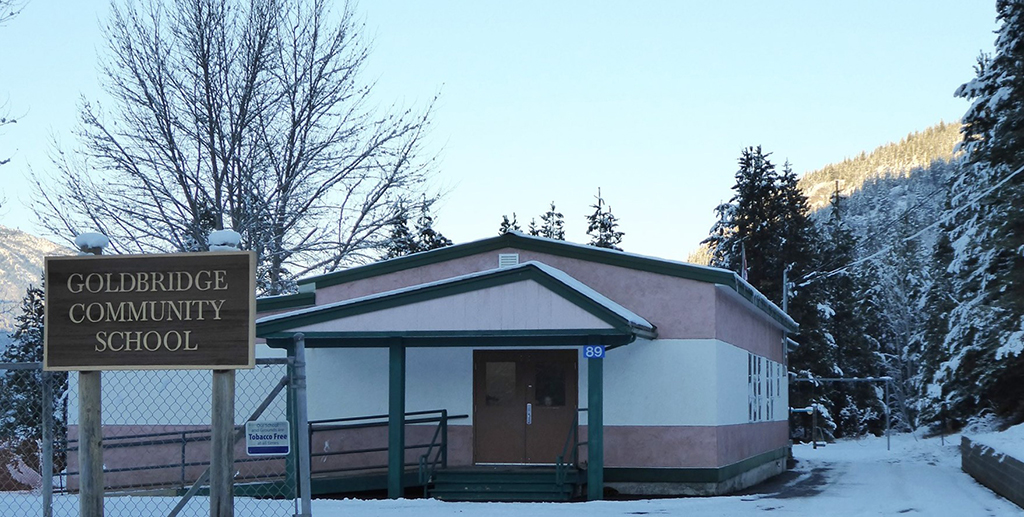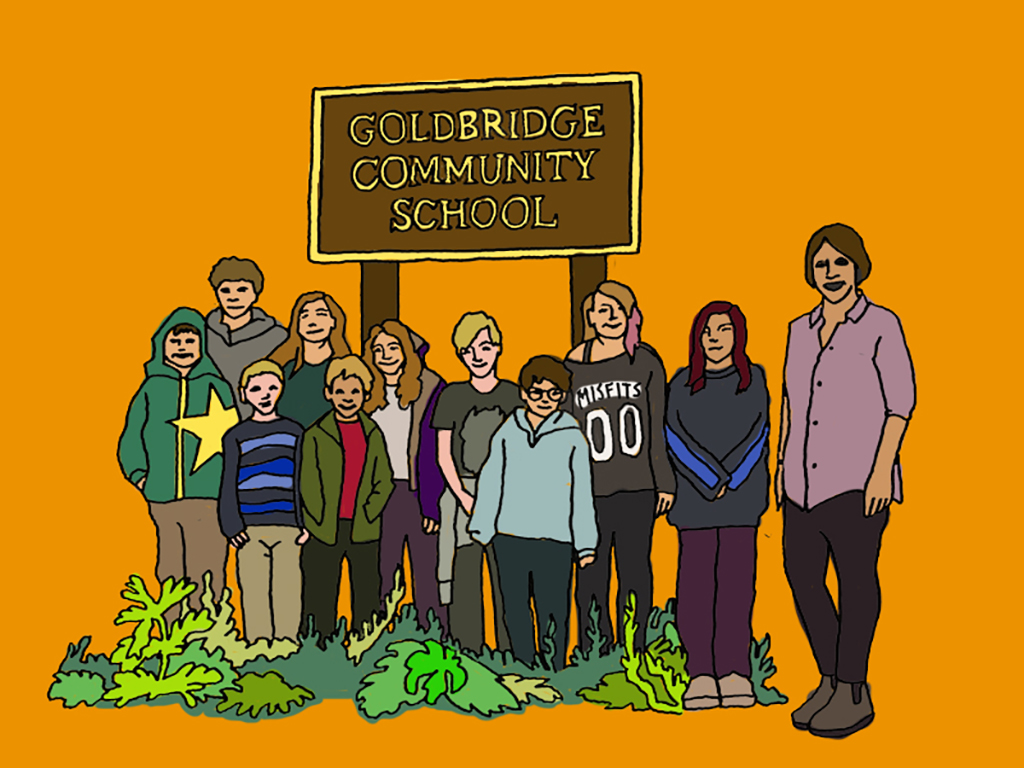[Editor’s note: This piece, published in the spring 2021 edition of British Columbia Magazine, is a chapter in the just released book 'Tales of BC: 50 Years of Wild, Wacky and Thought-provoking Adventures' by Daniel Wood, collected pieces by the highly regarded magazine writer who died in September. We reprint it here with permission from OP Media Group.]
This is a story about fortitude, imagination and risk, and how four adventurous women — linked by odd circumstances — have faced the challenge of surviving in the mountains of British Columbia. At one level it is the story of gold, and how its magnetic appeal has drawn people back to the ghost towns of the Upper Bridge River Valley, far to the west of Lillooet.
At another level, it is about children, and how a remote school provides families with the opportunity of living and working there at the edge of wilderness.
And at still another level it is about Anna Driehuyzen, who — deep into middle age — abandoned a secure teaching career and moved to the tiny village of Gold Bridge as the only teacher of 10 kids, spread from Grade 1 to Grade 7. She presides, at 58, over the very last one-room school in British Columbia.* It is, in these ways, a story about the redemptive power of love and the dangers nature sometimes imposes.
After 12 years teaching kids at the alternative Waldorf School in North Vancouver, Driehuyzen found herself thinking, Do I stay here forever? She loved the job, she loved the kids and she loved the curriculum based on integrating all facets of learning — nature, mythology, play, adventure and writing — into children’s development. She loved, as well, city life: the concerts, restaurants, conversations with friends. But! There was this unusual job opening to teach in a place called Gold Bridge, B.C. Gold Bridge? she thought. Never heard of it. She soon discovered Gold Bridge was — to use her comic, self-deprecating assessment — “a god-forsaken, isolated town… in the middle of nowhere.”
“I was wary. But I’m an odd duck. I’d have to buy a four-wheel-drive vehicle — the Hurley Pass road is rough! — to get into the place. I figured I could take it for a year.” That was six years ago.
Over the decades, time has not been kind to Gold Bridge. The population of its cemetery, as shown by the rows of crosses on a bluff above the Bridge River, is far greater than the current population of the town. Which is 43. There’s an aging general store and an adjacent hotel/bar, its interior wallpapered with thousands of dollars of autographed and dated real $2 and $5 bills. And next door, there’s 56-year-old Bruce-the-Deuce’s firewood and chicken-surrounded house trailer with a road sign that reads: “WOOD EGGS MUSIC FIXIT,” a message reflecting the multi-tasking that wilderness residents often embrace in order to survive. That, in its entirety, is downtown Gold Bridge. Along the river in late October, the cottonwoods are turning yellow. And in every direction the forested ridges rise to icefields and 2,500-metre snowcapped peaks.

Reflecting on what she once saw as a “hair-brained idea,” Driehuyzen says today of her life in Gold Bridge, “It’s a little bit of the Wild West here. There’s a maverick quality about the people — open-minded, open-hearted, very independent. It’s not like living in the city — everybody running hither and thither. I feel like I’ve found my place. I read a lot. I hike. I cross-country ski. And as a teacher — as the only teacher in a one-room school — I’m it. I’ve got a lot of freedom. So do the kids. It’s a rare day I don’t think: ‘I love this!’”
But with the school’s total student numbers countable on one hand when she arrived, there was the nagging question of whether maintaining a one-room school in the middle of nowhere made sense.
When Debbie Demare, then 52, settled on Gun Lake in 2007, she soon became aware the Gold Bridge Community School was facing closure. It had three students. At the same time, there were reports the long-shuttered Bralorne Mine was reopening. That meant jobs, more workers, potential economic recovery for the remote Upper Bridge River Valley. “In a place like Gold Bridge,” says Demare today, “a school makes a community. Without a school, there’s no hope in heck of having families move into the valley. Without kids, you lose the fabric of community. Rural schools are where people meet.”
For the past 10 years, Demare has served as regional district director, representing the 222 residents of the region, fighting to keep the school open. She knows it’s a tough argument. Limited tax dollars. Skeptical educational authorities. Teachers come. Teachers go. Isolation takes its toll. It’s tricky staffing a one-room school — with students spanning seven grades. Especially when it’s a two-hour, 105-kilometre drive to the closest town.
Erin Bruchet, a youth therapist, moved into a Gun Creek Road prospector’s cabin in 2019 with her geologist husband and two children, Beatrice, 9, and Henry, 6. She’d heard about Driehuyzen and her unusual one-room school. And knew from visiting there how different it was from her kids’ former curriculum-bound, listen-to-the-teacher Vancouver classrooms.
“I was absolutely captivated by Anna and her teaching,” Bruchet says today. “I saw she encouraged the preservation of childhood. School wasn’t just about information. School was about freedom. About being a kid! About learning from doing stuff.”
The kids visit, she explains, the chicken guy — Bruce-the-Deuce — and learn about eggs. They plant their own vegetables in the school’s community garden and later make potato-leek soup with Driehuyzen. (They also make occasional pets of garden worms.) They perform recorder concerts. They go on parent-led, educational nature hikes. There are regular ski and snowshoeing trips, and hockey games on Little Gun Lake. All these become topics for written reports and discussion.
Last Dec. 21, the school’s mothers established a candlelit labyrinth through the darkened ghost town of Bradian. The kids were then taken there and told about ancient myths tied to the year’s longest night. And how these myths link to Christmas, four days later. At the centre of the maze — around a bonfire — the toque-topped kids lit their own candles as part of a winter solstice ritual. Fire became the symbol of renewal; and candlelight illuminated the path ahead. Her son Henry announced to her afterwards, “That was the best day ever!”

For people who live at the province’s frontiers, far from urban conveniences and reliable services, the path ahead is sometimes darkened by natural dangers. In summer, forest fires threaten remote settlements like Bralorne or Bradian. Grizzly bears and wolves appear. Winter brings sub-zero cold and metre-deep snowfall to the Gold Bridge region. Power is lost for a day… or a week. Candlelight is not a spiritual lesson, but a necessity. Pipes freeze. Snowmobiles don’t start. Avalanches block roads. In the wilderness, things can — on occasion — go seriously wrong.
Alexandra Zalite, 49, lives with her husband and their two sons, Zane, 7, and Wesley, 11, a kilometre beyond the end of Bralorne Road, in the wilderness above Gold Bridge. Their home has no phone, no electricity and no running water. The four of them are the only residents of Pioneer, a former gold mining town whose refinery is now a massive pick-up-sticks of flood-produced debris in Cadwallader Creek.
On most days, Zalite leaves Pioneer at 8 a.m. and gets to Gold Bridge and its school at 8:30 a.m., just in time to see Driehuyzen appear to ring her brass bell, calling the kids indoors. There’s a tumult of voices and elbows, backpacks and boots as the kids hit the mudroom. The word “slow” does not appear to be part of the children’s vocabulary. Zalite sometimes works in the school, joining others in parent-assisted activities. (She’s one of the people who organized last winter’s Bradian solstice ritual.)
“The kids are getting a top-notch, amazing education,” Zalite observes. “It takes a certain personality to want to live in a tiny place like this. Anna’s got it. She plays with the kids. They do jump-rope together. They knit together. They mountain bike together. The kids love her.”
On a frigid March night two years ago, Zalite found herself returning home in the family’s pickup after a heavy snowfall. The final kilometre of her route required she use her parked snowmobile on the unplowed driveway. But the snowmobile wouldn’t start. The snow was knee-deep. It was -13 C. And the night moonless. She began walking. Disoriented in the darkness, she fell down the steep bank of Cadwallader Creek, twisting her ankle and losing her right boot in the icy, rushing water. She began crawling through the snow, fighting to make it home. Her last memory before passing out was thinking this: I can’t stop! I can’t stop! Her husband found her, unconscious, half-buried in snow, 12 hours later. Two years have passed since Zalite lost the toes on her right foot. She knows how, in the wilderness, the path ahead is not always illuminated, that things can go seriously wrong.
“I know people who’ve been caught in avalanches up here. And a guy who was attacked by a grizzly,” she says of Pioneer life. “It’s more extreme here. You’re really living on the edge.”
People like Zalite and Driehuyzen choose to live in this place knowing that its occasional dangers are balanced out when its surprises occur. One confronts a grizzly on an alpine trail. Or a blizzard of yellow, wind-propelled cottonwood leaves fall. Or an annoying rockfall blocks a mountain road. Or millions of blooming, late-July wildflowers create a Persian carpet below Eldorado Mountain. Those who live in the Bridge River Valley get to glimpse, on occasion, rarely seen terra incognita — the little epiphanies of nature.
Such moments provide consolation for the times the power goes out in Bralorne or the snowmobile doesn’t start in Pioneer. Urban children — too often over-parented and zombified by cellphones — seldom get these opportunities. Theirs is a two-dimensional world. Wilderness provides surprise, awe, danger, ambiguity. These, Driehuyzen knows, lie at the heart of learning.
The original piece claimed Gold Bridge’s one-room school was the last in B.C. But we’ve received word that’s not the case. “Thetis Island has a one-room school house K-7, with about 14 kids this school year,” writes Jeannine Caldbeck. We trust she knows, since she is the fire chief of Thetis Island fire department. And commenter ‘Ignatius Kizoo’ alerts us to “Toad River School an hour and a half north of Fort Nelson on the Alaska Highway? K-12 maybe a dozen kids — been there for decades and still open.” Anyone else in B.C. want to add a one-room school house to the list in the comments section?
![]()
Read more: Education















Tyee Commenting Guidelines
Comments that violate guidelines risk being deleted, and violations may result in a temporary or permanent user ban. Maintain the spirit of good conversation to stay in the discussion.
*Please note The Tyee is not a forum for spreading misinformation about COVID-19, denying its existence or minimizing its risk to public health.
Do:
Do not: